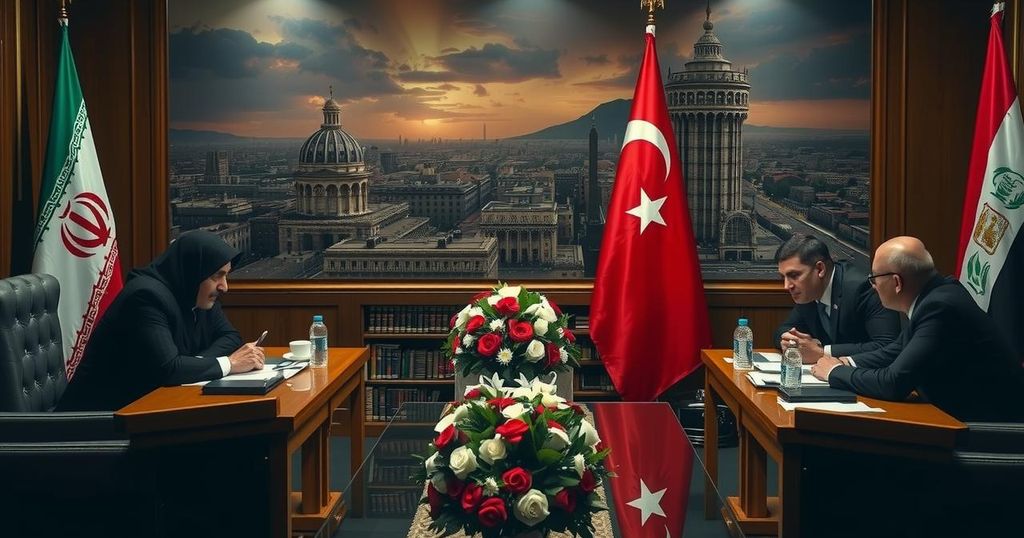Iranian Foreign Minister Engages with Egyptian Officials Amidst Regional Tensions
Iran’s Foreign Minister Abbas Araghchi visited Cairo, marking the first such diplomatic engagement in nearly ten years, where he discussed rising regional tensions with Egyptian officials. Key topics included addressing the conflicts in Gaza and Lebanon, and calls for humanitarian aid amidst escalating violence. Araghchi’s visit is part of a wider diplomatic tour in the region, aligning with recent conversations among Arab leaders focused on establishing peace and de-escalating hostilities.
In a significant diplomatic engagement, Iran’s Foreign Minister Abbas Araghchi visited Cairo to address escalating regional tensions with Egyptian officials. This visit marks the first time in nearly a decade that a senior Iranian official has visited Egypt. During his discussions with Egyptian Foreign Minister Badr Abdelatty and President Abdel-Fattah el-Sissi, the key focus was on strategies to mitigate the ongoing conflicts involving Israel, especially concerning Gaza and Lebanon. President el-Sissi emphasized the urgent need to terminate Israel’s military actions in Gaza to avert further escalation into a broader conflict that could threaten the security of all regional nations. He also called for an end to violence in Lebanon and the West Bank while stressing the importance of delivering humanitarian aid to affected areas. Araghchi’s trip is part of a broader diplomatic initiative aimed at reducing regional tensions, with prior discussions held in countries such as Syria, Lebanon, Qatar, Oman, and Iraq. Following his engagements in Egypt, he plans to travel to Turkey. The diplomatic missions come at a delicate time, as Israel is preparing for potential military reprisals following a recent Iranian missile strike directed at Israeli territories on October 1. Additionally, Araghchi met with Jordan’s Foreign Minister Ayman al-Safdi in Amman to deliberate on regional stability amidst ongoing Israeli aggression towards Gaza and Lebanon. This visit follows a meeting between Saudi Crown Prince Mohamed bin Salman and President el-Sissi, where they reached a consensus on the necessity of establishing an independent Palestinian state as a cornerstone for long-term peace and security in the region. An official statement from the Egyptian government indicated that both leaders emphasized the importance of de-escalation measures, including an immediate ceasefire in Gaza and Lebanon, while addressing the deteriorating humanitarian situation and maintaining respect for Lebanon’s sovereignty and stability.
The context of Iranian Foreign Minister Abbas Araghchi’s visit to Egypt revolves around increasing tensions in the Middle East, particularly due to the ongoing conflicts involving Israel and Palestinian territories. The region is grappling with heightened military actions, and there are growing concerns over the potential expansion of Israeli operations into wider regional conflicts. Egypt has historically played a mediating role in Arab-Israeli relations, and Araghchi’s visit signifies efforts from Iran to engage with Arab nations amidst these tensions. The diplomatic outreach by Iran, especially following a missile attack on Israeli soil, indicates a strategic maneuvering aimed at rallying support or at least securing dialogue with regional powers.
In conclusion, the recent visit of Iranian Foreign Minister Abbas Araghchi to Cairo illustrates an important effort to engage in dialogue regarding the pressing issues of regional tension and conflicts involving Israel and its neighboring states. Egypt, under President Abdel-Fattah el-Sissi, is asserting its role in advocating for peace and stability in the region by calling for an end to hostilities and seeking humanitarian solutions. This diplomatic engagement, coupled with conversations among other regional leaders, highlights the intricate dynamics at play that could shape the future of Middle Eastern geopolitics and peace efforts.
Original Source: apnews.com




Post Comment